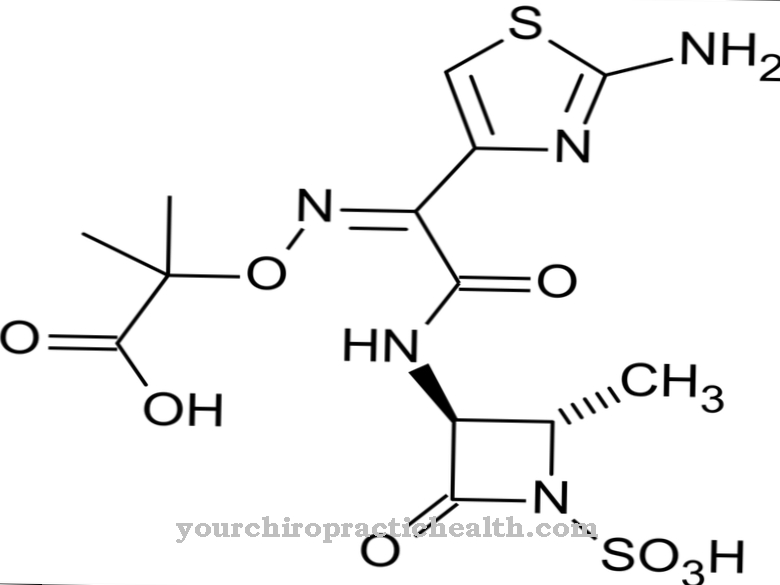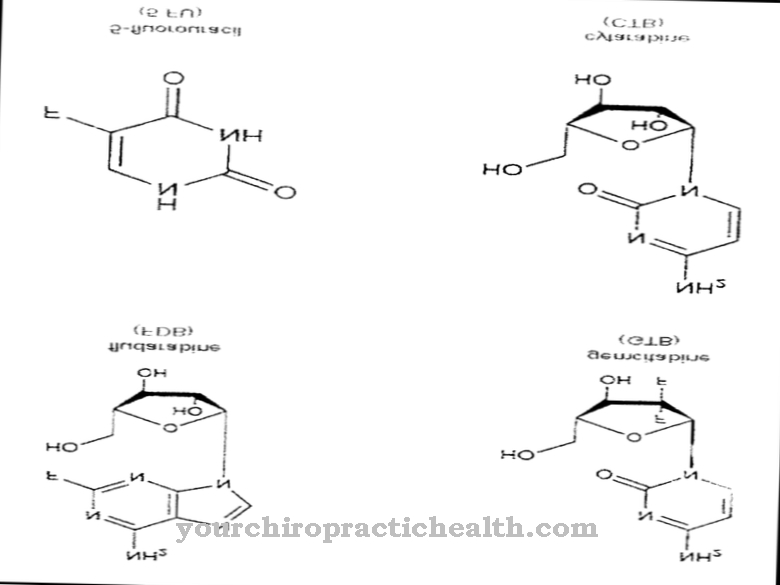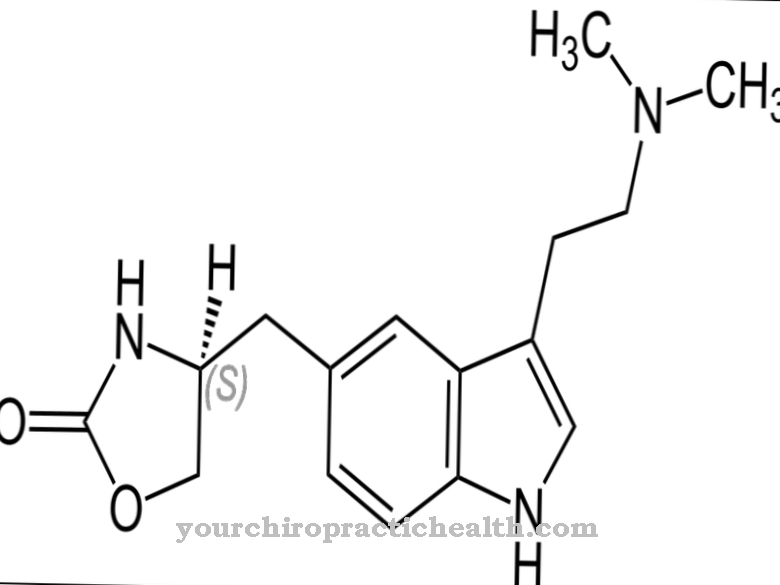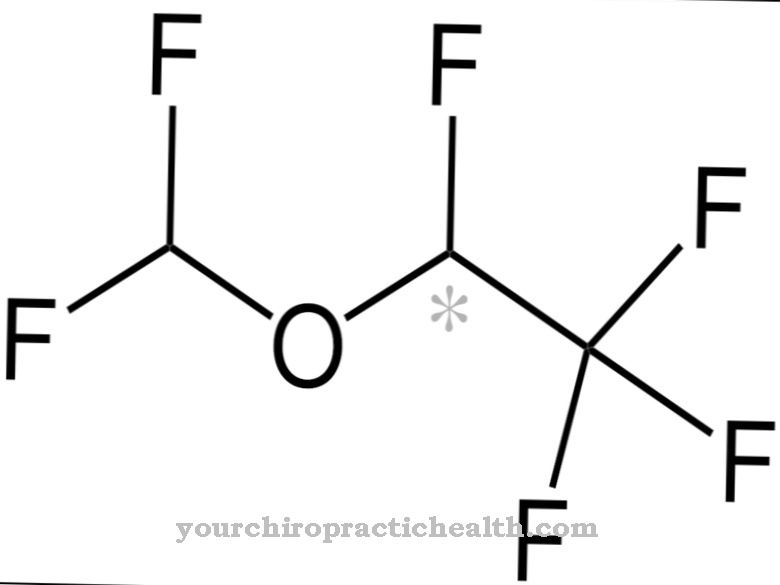Benzatropine is a drug from the class of anticholinergics. It is used to treat motor movement disorders. This active ingredient is mainly prescribed for Parkinson's patients and movement disorders that occur as side effects of neuroleptics. Based on positive research results, clinical test series in the field of multiple sclerosis are also being considered.
What is Benzatropine?

Becomes pharmaceutical Benzatropine mesilate used. It is the salt of benzatropine and methanesulfonic acid, which results from the reaction of these two substances. Benzatropine mesilate acts as a central anticholinergic.
The main task of this drug is to restore the balance of the three important messenger substances dopamine, acetylcholine and glutamate in the brain, which is severely disturbed by Parkinson's disease. This disorder causes the typical side effects of paralysis such as tremor, sedentary lifestyle, muscle stiffness and motor disorders.
Pharmacological effect
The human brain has a complex networked system of motor billing units, which ensures smooth movement and adequate muscle activity without the human having to consciously think about these processes. The brain and the responsible messenger substances take into account not only the depth of sensitivity, the position and movement of joints, but also the prevailing emotions such as feeling and body language, for which the cortex of the cerebral cortex is responsible. With this complex system, humans are able to control their fine motor skills.
Benzatropine is used to treat people with Parkinson's disease. Although this disease of the central nervous system in the form of shaking paralysis has not yet been cured, the drug benzatropine has a positive effect on the accompanying complaints such as tremors (tremor), restricted movement, slowing of movement (bradykinesia), muscle rigidity, rigid movement, disturbance of the adjusting and holding reflexes ( postural instability) and unstable posture.
Often, mild disease courses are observed, which can be controlled so well with the active ingredient that there are only minor restrictions. For people who are dependent on perfect fine motor skills due to their job, for example doctors or watchmakers, Parkinson's disease can become an existential problem.
Finding the right therapeutic approach is often not easy because it is not clear how this paralysis develops. Various factors can be triggers. In its role as a messenger substance, dopamine significantly influences the control processes of the musculoskeletal system. It is mainly formed in the special nerve cells of the brain, the so-called black substance (substantia nigra). The messenger substance activates movement via a complicated control loop. In a healthy brain, however, it also has a regulating effect on the cholinergic interneurons that dopamine uses as a transmitter. In the case of Parkinson's disease, this dopamine inhibition is absent and the cholinergic interneurons are too active. If they fail, they cause Huntington's disease and cause the breakdown of the part of the brain that is responsible for controlling muscles.
Other messenger substances involved in movement control are acetylcholine as a neurotransmitter for regulating various movement sequences and glutamate. Acetylcholine is mainly responsible for the transmission of excitation between nerves and muscles and acts as a transmitter within the central nervous system. As a transmitter, glutamate stimulates the striatum (striped body) of the cerebral hemisphere.
In Parkinson's disease, the black matter nerve cells die. Anticholinergics in the form of benzatropine counteract the imbalance of the messenger substances and reduce the symptoms, so that most patients can live well with their disease and their life expectancy is hardly restricted.
Medical application & use
Benzatropine is used as an anti-Parkinson agent, for drug-related Parkinson’s symptoms, sitting restlessness (akathisia), acute dystonia (neurological movement disorder), secondary dystonia and idiopathy (illness with an unknown cause).
Benzatropine is an anticholinergic that has a balancing effect on the central nervous system. Anticholinergics are used in patients who are not older than 70 years and who have only mild symptoms. Mainly, this drug works against the tremors, which are a major burden in everyday life for most patients. In this way, the symptoms in the early stages of Parkinson's disease can be treated.
Patients take benzatropine in tablet form two to three times a day. Although it can cause some undesirable side effects and there are also contraindications to watch out for, benzatropine is a better choice compared to levodopa therapy. Because of the side effects, levodopa is not used in younger patients if possible, as treatment can only be given for a few years.
You can find your medication here
➔ Medicines to calm down and strengthen nervesRisks & side effects
Registered side effects include: dry mouth, vomiting, nausea, loss of appetite, intestinal obstruction, constipation, urinary retention, visual disturbances, pupil dilation, difficult urination, psychological changes, slowed reactions, abnormal increase in body temperature, skin changes and tachycardia (accelerated pulse).
The following clinical pictures constitute a contraindication: cerebral palsy, toxic megacolon (chronic enlargement of the large intestine due to constipation), acute pulmonary edema, mechanical intestinal stenosis, narrow-angle glaucoma, tachyarrhythmia (cardiac arrhythmia), pyloric stenosis (narrowing of the stomach outlet), adhesions with intestinal obstruction., , paralytic ileus, severe ulcerative colitis (chronic inflammatory bowel disease), hypersensitivity to one of the active ingredients of the drug and other anticholinergics.
Caution should be exercised in its use if patients are over 65 years of age, are pregnant, or in children and patients who are prone to confusion and urinary retention. A check is also necessary in patients with cardiac arrhythmias, angina pectoris (chest tightness) and all diseases that can cause an increased pulse rate, e.g. B. Hyperthyroidism. An organic psychosyndrome can also prevent the use of benzatropine. Heat exposure and decreased sweating can also be dangerous when combined with this drug. There are also possible interactions with tricyclic antidepressants and phenothiazines (neuroleptics).
























.jpg)



